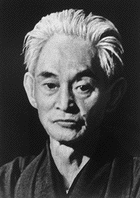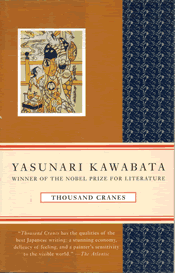
Sembazuru
(Thousand Cranes)
Yasunari Kawabata
Translated by Edward G. Seidensticker
It is difficult to discuss a novel like Thousand Cranes without being personal because it is a personal book.
Thousand Cranes is definitely a family affair where the past has intertwined with the present to such an extent the reader (and Kikuji) can no longer distinguish what is the result of karma and what truly is. It begins with Kikuji's father who, in typical male arrogance, seizes dominance over three women: his wife and mother to Kikuji, the jilted mistress Chikako, and the lonely widow Mrs. Ota. Years later, Kikuji, who is haunted by a living embodiment of the poison of his father's sins, is indecisive. He is a pathetic marionette ruled by his own subtle passion for the "Inamura girl" and his father's mistress and later, the daughter of his father's mistress. His restraint and indisposition often enrages the reader. Even against Chikako, with her ugly birthmark and long history of poison, he does not know what he believes. Kikuji, like all the characters of the book, is a disturbed creature.
Despite the strong emotions and the events that run through this 147-page book, Thousand Cranes has time to detail everyday beauty and the atmosphere of pleasant company. Yasunari Kawabata is a genius with restraint -- the writing is simple and never overdone.
Thousand Cranes is a book of emotions. Readers are painfully subjected to the machinations of Chikako Kurimoto, to Kikuji's quiet passion towards Mrs. Ota and her daughter.
We also become witness to the haunting shadow of the "Inamura girl" who wears (and moves) with the grace of something beyond human desires. The plot is not complex yet the actions of each character, their words, emotions and their ideas are so genuine they are as difficult to interpret as people in our lives.
Rating:
![]()

Yasunari Kawabata made his debut as a writer with the semiautobiographical short story, Izu no odoriko (Izu dancer), published in 1927. He won the Nobel Prize for Literature in 1968. Among his other works include Yukiguni (1948; Snow Country) and Yama no oto (1949-54; The Sound of the Mountain).
Sembazuru (Thousand Cranes), a series of episodes centred on the tea ceremony, was begun in 1949 and never completed.
Yasunari Kawabata committed suicide on April 16, 1972 after the death of his friend, Mishima Yukio.

Thousand Cranes
Yasunari Kawabata
Translated by Edward G. Seidensticker
www.randomhouse.com
 |
 |
 |
 |
 |